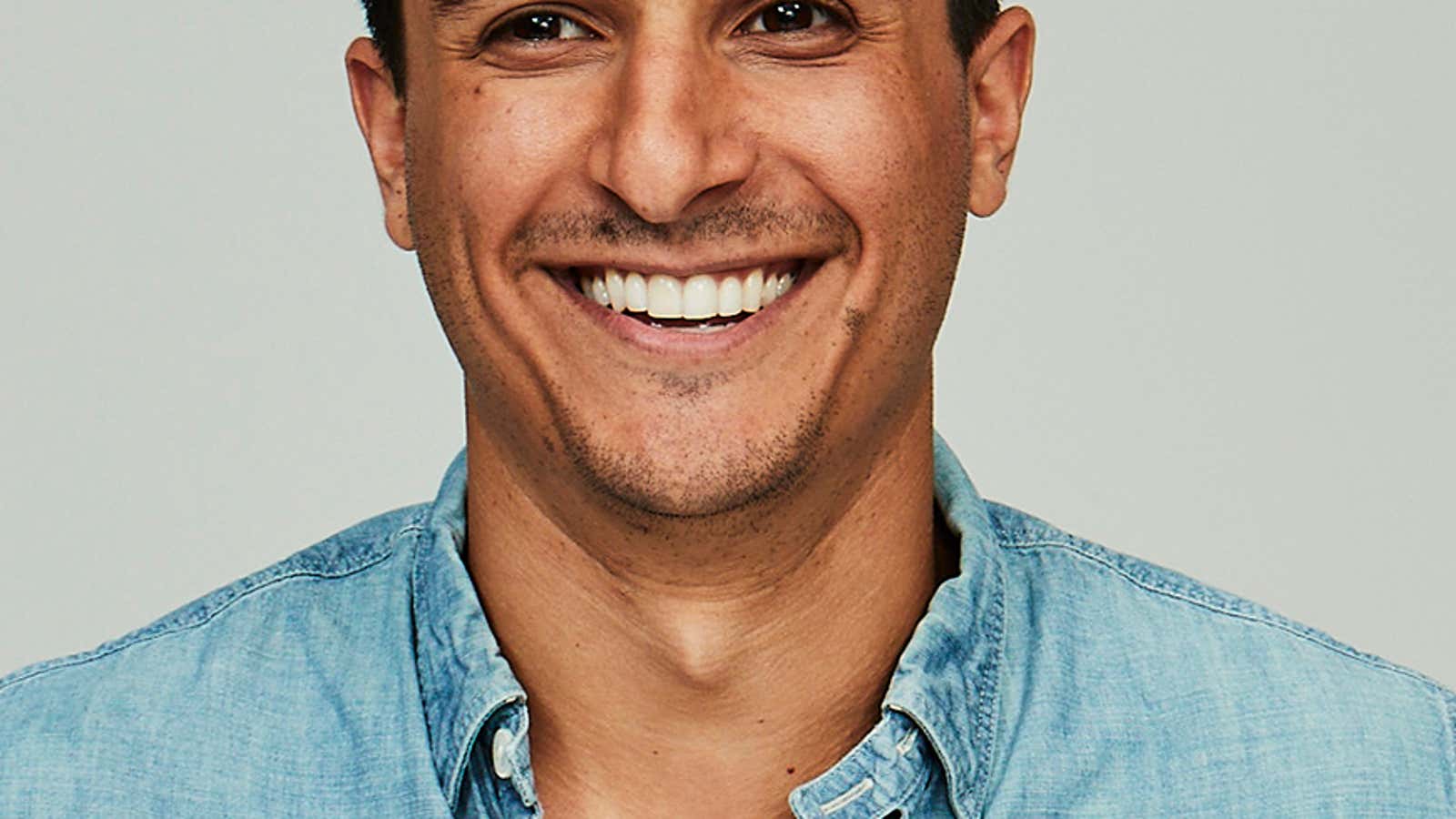Referred to by some as the “Glossier for Dudes,” the men’s grooming and wellness company hims was born out of founder Andrew Dudum’s personal grooming struggles. One night in 2016, his sister pointed out his dry skin and breakouts. She urged him to buy some French skin products, as he recounts in Racked, which he spent $300 on every month. He soon came to the realization that this was absurd and decided to start his own company that same year, helping men confront their bodies—specifically male-pattern balding, erectile dysfunction, and acne—with science-backed solutions.
Having co-founded and served as general partner at Atomic, a company that builds new startups with big-name backers like Peter Thiel and Marc Andreessen, Dudum already had experience as an entrepreneur.
Today, hims, which New Yorkers might know from its clever subway ads featuring droopy cacti and cracked eggs, offers monthly subscriptions to doctor-prescribed medications, vitamins, and topical products. The website also provides ample educational content addressing the anxiety that wellness pressures can cause men. (Also, Snoop Dogg is a fan.)
In a conversation with Quartz, Dudum reveals why he insisted that hims’ board of directors be gender equal, how hiding emotions stunts men’s health, and why he’s sometimes anxious about mentoring women.
1. Did you actively think about workplace gender inequality prior to the Me Too movement? And what’s the most important lesson you’ve learned from Me Too?
hims has been set up since day zero to have equal gender representation across the board, executive board, and team. We wanted to build a brand for men that looks, feels, and talks differently than everyone else, and realized from the get-go that we need as many perspectives at the table as possible. A lot of companies are being (rightfully) reprimanded in the wake of Me Too due to lack of representation; for us, it’s an important reminder of the values around diversity and respect we already practice.
2. Do you identify as a feminist? Why or why not? How do you define your feminism?
Yes—I proactively support and advocate for equal representation of women in the workplace, and beyond.
3. What do you do on a daily basis to advance gender equality?
I prioritize fair compensation, equal representation when it comes to hiring, and also in strategic business meetings, and seek balanced perspective from investors with diverse backgrounds.
4. What’s the biggest threat to men in America today? Why?
This idea that men aren’t allowed to express emotions, especially among one another. That’s a big reason why we started hims; men were not asking for help or having open conversations about really personal topics with their peers, partners and doctors. Men will face so many challenges down the line if they judge themselves, or are judged, for opening up.
5. Do you talk about sexism with your male peers? If so, what strategies prove most effective, and if not, what inhibits you from doing so?
As a founder, you don’t get handed a playbook with advice on creating company culture. I’ve always prioritized fair hiring above all else, and feel a responsibility to advise and empower others to create unbiased work environments. I frequently engage friends and other founders on the topic, knowing the first step is to start a candid conversation against sexism in the workplace.
6. What is your biggest anxiety about being a man?
When it comes to my job, I feel anxiety about not providing enough personalized support or mentorship to women. It’s a challenge to create a culture of inclusivity while still making time for one on one check-ins. Regardless of gender, I’ve seen how individualized support increases performance and productivity within the team.
7. What do you wish your female co-workers, and women at large, knew about you?
The three greatest influences on my life are my mom and two sisters. I’ve learned so much from my mom’s mentorship and the tough love from my sisters.
8. Some men feel like they can’t win: They’ll be criticized by men for speaking up, and by feminists for not speaking loud enough. What would you tell these men?
Get thicker skin. The “right side” of this issue is human: equal voices, rights, and opportunities for all genders.
9. If you could take back one thing you’ve said or done that contributed to bias at work or at home, what would it be? Why?
At home, it’s really easy for me and my partner to fall into traditional gender roles, but we both work the same amount, we both value independence and our family networks—and I realized we need to be dividing our duties differently. That’s respect.
10. What’s the best advice you’ve received from another man, and what’s your best advice for young men today?
Someone once told me that “talent is universal, opportunity is not” and if you want to build a successful company, you’ll need the smartest people to help you. I would stress looking beyond your core group of peers, as they likely think similarly and share many of your values. Diversity, whether background, gender, or socioeconomic, is an integral component to surrounding yourself with a range of perspectives and building a strong business.
